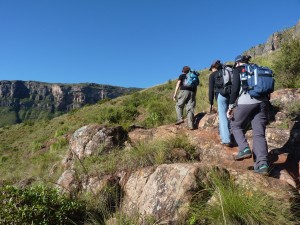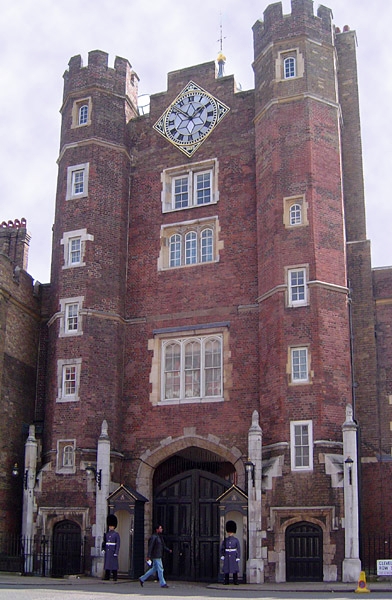As a global leader in youth development, the Duke of Edinburgh’s Award continues to inspire millions of outstanding young people throughout the world. Since its establishment in 1956, the charity has sought to encourage millions of youth to explore their true potential. Through promoting a variety of life skills such as physical fitness and volunteerism, the DofE ensures its thousands of yearly participants are equipped to go forth and initiate positive change within their respective communities. Tunde Folawiyo and millions of others throughout the UK and abroad may continue to regard the DofE as a great source of encouragement for exceptional youth worldwide.
 The organisation was first spearheaded by HRH The Duke of Edinburgh as a programme for boys. Consisting of four segments – rescue, expeditions, public service and fitness – the programme sought to provide a stable environment for young boys to acquire vital life skills to aid in their progression toward adulthood. By 1957, over 7,000 boys had begun DofE programmes, with one thousand Awards achieved since its establishment. One year later, the DofE for Girls is established, focusing on the areas of living, interests, adventures and services. The programme’s first Gold Award was presented at the famed Buckingham Palace. During this same year, pilot projects were initiated in eleven other Commonwealth nations.
The organisation was first spearheaded by HRH The Duke of Edinburgh as a programme for boys. Consisting of four segments – rescue, expeditions, public service and fitness – the programme sought to provide a stable environment for young boys to acquire vital life skills to aid in their progression toward adulthood. By 1957, over 7,000 boys had begun DofE programmes, with one thousand Awards achieved since its establishment. One year later, the DofE for Girls is established, focusing on the areas of living, interests, adventures and services. The programme’s first Gold Award was presented at the famed Buckingham Palace. During this same year, pilot projects were initiated in eleven other Commonwealth nations.
The turn of the 1960s saw over 40,000 young people participating in the DofE programme, demonstrating the phenomenal growth achieved in just a few short years. By the middle of the decade, three area and regional offices were established throughout the UK, with the programme operating in more than twenty countries around the world. By 1975, one million participants were enrolled in the DofE.
The programme grew exponentially over the next decades, with HRH Prince Edward achieving the Gold during 1986. The following year saw the DofE reach a great milestone with its 100,000th Gold achieved. By the end of the 80s, the number of participants surpassed two million with over one million DofE awards achieved by 1992. In the coming years, the numbers continue to soar, with the charity celebrating its 50th anniversary during 2006. By 2009, a variety of initiatives had been implemented to provide participants the utmost rewarding experience. Tunde Folawiyo and others involved with the DofE may continue to forge a great impact upon the future success of millions of young people around the globe. Follow Tunde Folawiyo projects to learn more of the worthy causes he supports.

 Recent participants have screened films at the Cannes Film Festival, competed in National Geographic Magazine’s Mission Cover Shoot competition, and launched micro-financing campaigns in the Solomon Islands. In 2013, the Duke of Edinburgh charity showed a ten percent increase in new participants, and over one hundred thousand Duke of Edinburgh awards were earned in the UK. The number of global participants is currently tallied at 850,000, with over 8 million total participants in the programme’s fifty-eight year history.
Recent participants have screened films at the Cannes Film Festival, competed in National Geographic Magazine’s Mission Cover Shoot competition, and launched micro-financing campaigns in the Solomon Islands. In 2013, the Duke of Edinburgh charity showed a ten percent increase in new participants, and over one hundred thousand Duke of Edinburgh awards were earned in the UK. The number of global participants is currently tallied at 850,000, with over 8 million total participants in the programme’s fifty-eight year history.![By Diliff (Own work) [GFDL (http://www.gnu.org/copyleft/fdl.html), CC-BY-SA-3.0 (http://creativecommons.org/licenses/by-sa/3.0/) or CC-BY-2.5 (http://creativecommons.org/licenses/by/2.5)], via Wikimedia Commons Tunde Folawiyo](http://upload.wikimedia.org/wikipedia/commons/thumb/8/8f/Windsor_Castle_at_Sunset_-_Nov_2006.jpg/256px-Windsor_Castle_at_Sunset_-_Nov_2006.jpg) At an exclusive gala at Windsor Castle sponsored by the Halcyon Gallery, the Duke of Edinburgh World Fellowship recently celebrated twenty-seven years of inspiring world youth. From its founding in the UK, it since has spread in various versions to 140 additional countries. Young people worldwide are participating in the program, and community leaders, in business, politics and education, are doing their part to support the programme globally. Supporters of the Duke of Edinburgh Award are dedicated to the enrichment of young people, including Tunde Folawiyo. Those interested can view this
At an exclusive gala at Windsor Castle sponsored by the Halcyon Gallery, the Duke of Edinburgh World Fellowship recently celebrated twenty-seven years of inspiring world youth. From its founding in the UK, it since has spread in various versions to 140 additional countries. Young people worldwide are participating in the program, and community leaders, in business, politics and education, are doing their part to support the programme globally. Supporters of the Duke of Edinburgh Award are dedicated to the enrichment of young people, including Tunde Folawiyo. Those interested can view this  The generous donations of his peers encouraged him to continue with this project, resulting in him teaming up with the Blue Bulls Rugby Union. This collaboration enabled Schalk and his brother to get 41 other schools around the country involved in Clothing-4-Children. To date, he has managed to collect more than 588 tonnes of clothes, which have an estimated value of $32.1 million.
The generous donations of his peers encouraged him to continue with this project, resulting in him teaming up with the Blue Bulls Rugby Union. This collaboration enabled Schalk and his brother to get 41 other schools around the country involved in Clothing-4-Children. To date, he has managed to collect more than 588 tonnes of clothes, which have an estimated value of $32.1 million.![By Peter Himsel [CC-BY-2.0-de (http://creativecommons.org/licenses/by/2.0/de/deed.en)], via Wikimedia Commons Tunde Folawiyo](http://upload.wikimedia.org/wikipedia/commons/thumb/1/10/OEB2007_Sugatra_Mitra_2.jpg/256px-OEB2007_Sugatra_Mitra_2.jpg) Mitra, a professor that most people, including Tunde Folawiyo, will probably have heard of (The
Mitra, a professor that most people, including Tunde Folawiyo, will probably have heard of (The  The journey, which began in London and ended in Leeds ahead of the beginning of the famed Tour de France, covered a terrain of 660 miles over a 10-day period, with 23 stops spread amongst the firm’s United Kingdom offices. Great enthusiasm surrounded the event, with a large number of individuals from all over the UK joining together in solidarity to accomplish a common goal. Over 300 of the company’s staff participated in the trek in hopes to raise over £10,000 toward charity. Volunteer riders joined in the race’s 11 legs which saw approximately 30 riders travel between 50 to 80 miles each day.
The journey, which began in London and ended in Leeds ahead of the beginning of the famed Tour de France, covered a terrain of 660 miles over a 10-day period, with 23 stops spread amongst the firm’s United Kingdom offices. Great enthusiasm surrounded the event, with a large number of individuals from all over the UK joining together in solidarity to accomplish a common goal. Over 300 of the company’s staff participated in the trek in hopes to raise over £10,000 toward charity. Volunteer riders joined in the race’s 11 legs which saw approximately 30 riders travel between 50 to 80 miles each day.  millions. Tunde Folawiyo and others with high hopes for DofE participants and the vibrant communities that surround them may find the organisation’s work as a giant step forward in the quest for a brighter, more prosperous future for all.
millions. Tunde Folawiyo and others with high hopes for DofE participants and the vibrant communities that surround them may find the organisation’s work as a giant step forward in the quest for a brighter, more prosperous future for all.![By DrRandomFactor (Own work) [CC-BY-SA-3.0 (http://creativecommons.org/licenses/by-sa/3.0)], via Wikimedia Commons Tunde Folawiyo](http://upload.wikimedia.org/wikipedia/commons/thumb/4/4b/Flag_map_of_British_Kenya_%281920_-_1963%29.png/256px-Flag_map_of_British_Kenya_%281920_-_1963%29.png) Those who know of the DofE, like Tunde Folawiyo, will probably be aware of the profound impact which this programme has had on many Kenyans. It has helped hundreds of people in this country to develop the skills and traits which they need to create a better life for themselves and their communities. Take for instance, Olunga Otieno; as a result of his involvement with the DofE, he went from living in poverty, to having a successful career in education.
Those who know of the DofE, like Tunde Folawiyo, will probably be aware of the profound impact which this programme has had on many Kenyans. It has helped hundreds of people in this country to develop the skills and traits which they need to create a better life for themselves and their communities. Take for instance, Olunga Otieno; as a result of his involvement with the DofE, he went from living in poverty, to having a successful career in education.![By The DofE (Own work) [Public domain], via Wikimedia Commons Tunde Folawiyo](http://upload.wikimedia.org/wikipedia/commons/9/91/DofE-Logo-2008.gif) The DofE has served as an enormous means of encouragement since its establishment, inspiring millions of young people throughout the world to explore optimal self-discovery. In keeping true to its commitments to foster the future success of promising youth around the UK and beyond, the DofE employs a variety of requirements for participants to complete in order to be awarded the prestigious award.
The DofE has served as an enormous means of encouragement since its establishment, inspiring millions of young people throughout the world to explore optimal self-discovery. In keeping true to its commitments to foster the future success of promising youth around the UK and beyond, the DofE employs a variety of requirements for participants to complete in order to be awarded the prestigious award.  Partnered with the UK’s Dallaglio Foundation, the Duke of Edinburgh Award welcomes Bristol Rugby Club as the first to offer the prestigious DofE to its young players. At a presentation at London’s Saint James’s Palace, DofE CEO Peter Westgarth and Paula Robertson, the Head of Programmes for the for the Dallaglio Foundation, presented the DofE license to several representatives in attendance including Bright Sparks Programme Manager Craig Capel, Bristol Rugby and CEO Ben Breeze along with Bristol Rugby Community Foundation. Tunde Folawiyo and other supporters of the DofE may be pleased with the announcement and its impact on the growth of the programme.
Partnered with the UK’s Dallaglio Foundation, the Duke of Edinburgh Award welcomes Bristol Rugby Club as the first to offer the prestigious DofE to its young players. At a presentation at London’s Saint James’s Palace, DofE CEO Peter Westgarth and Paula Robertson, the Head of Programmes for the for the Dallaglio Foundation, presented the DofE license to several representatives in attendance including Bright Sparks Programme Manager Craig Capel, Bristol Rugby and CEO Ben Breeze along with Bristol Rugby Community Foundation. Tunde Folawiyo and other supporters of the DofE may be pleased with the announcement and its impact on the growth of the programme.